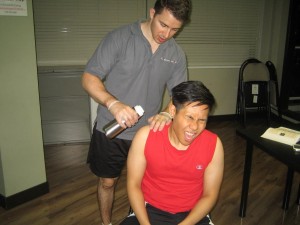Shoulder tendonitis involves inflammation of the rotator cuff and biceps tendon. This form of tendonitis is due to a tendon that is pinched by surrounding structures. It happens in sports that require movements where the arms move overhead repeatedly such as baseball, racket sports, weightlifting and strokes in swimming. The damage can be mild inflammation of the rotator cuff.
[youtube url=”https://www.youtube.com/watch?v=WETY5l3_Hz8″ width=”220″]When there is inflammation and thickening of the rotator cuff, it is trapped under the acromion or the roof of the shoulder which is part of the scapula or the shoulder blade.
Causes
- Shoulder tendonitis is due to repetitive micro trauma on the rotator cuff tendons.
- The rotator cuff tendon collides against the acromion bone where it becomes inflamed and the swelling.
What are the symptoms?

- Pain and tenderness of the affected shoulder
- Inability to hold the arm in certain positions
- Pain when lying on the shoulder or lifting with a straight arm
- A clicking sound in the shoulder
- There is pain and a clicking sound when moving the hand behind the back or head.
- Shoulder and upper arm pain and spreads as far as the elbow
- Shoulder tendonitis becomes severe; pain even when resting.
Treatment of shoulder tendonitis
- Take plenty of rest and avoid performing activities that triggered shoulder pain in the first place.
- Use an ice pack to lessen the pain and swelling. Wrap a few ice cubes in a small towel and apply on the affected shoulder for at least 20-30 minutes each for every 2-4 hours during the initial stage.
- Once the initial pain and swelling lessens, utilize a hot water bottle and rest the area on the bottle. This helps increase the blood circulation in the affected area and lessen the pain. Avoid placing the hot water bottle directly on the skin in order to prevent scalding. Wrap the hot water bottle in a towel before placing in the affected area.
- Avoid taking anti-inflammatory medication for first 48-72 hours in order to prevent bleeding.
- Keep the affected area immobilized by using a splint or a bandage or tape the shoulder in order to help protect from tendon injury and lessen pain. Stay in an upright position when sleeping and with a pillow support
- Seek the help of a physical therapist in order to help regain the full range of motion, joint mobilization, massage, muscle stretches and some light active-assisted and active exercises.
- Take the prescribed over-the-counter pain medications such as ibuprofen to help lessen the pain
FACT CHECK
https://physioworks.com.au/injuries-conditions-1/rotator-cuff-tendonitis
https://www.healthline.com/health/rotator-cuff-tendinitis
https://orthoinfo.aaos.org/en/diseases–conditions/shoulder-impingementrotator-cuff-tendinitis
